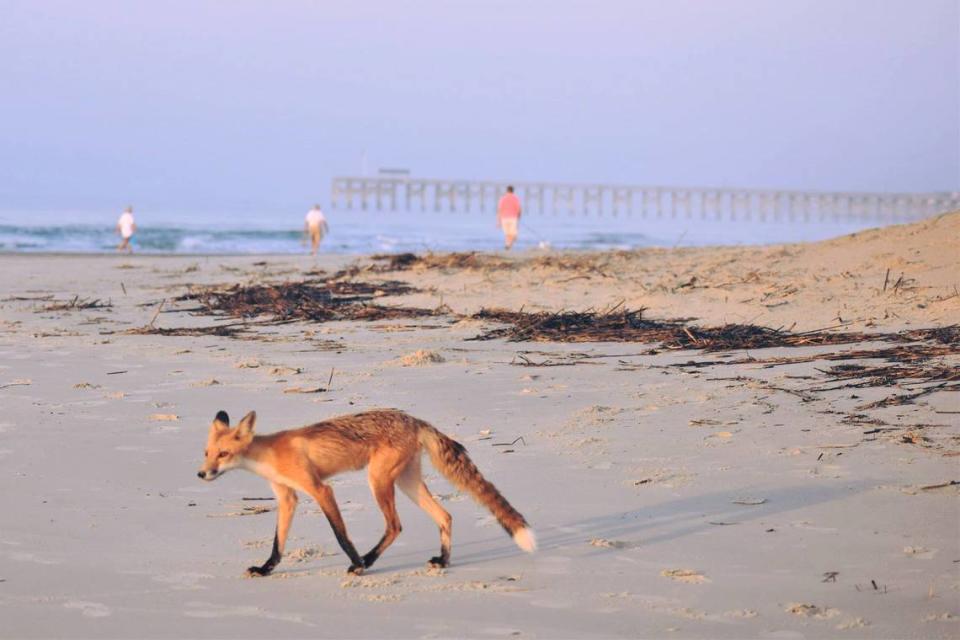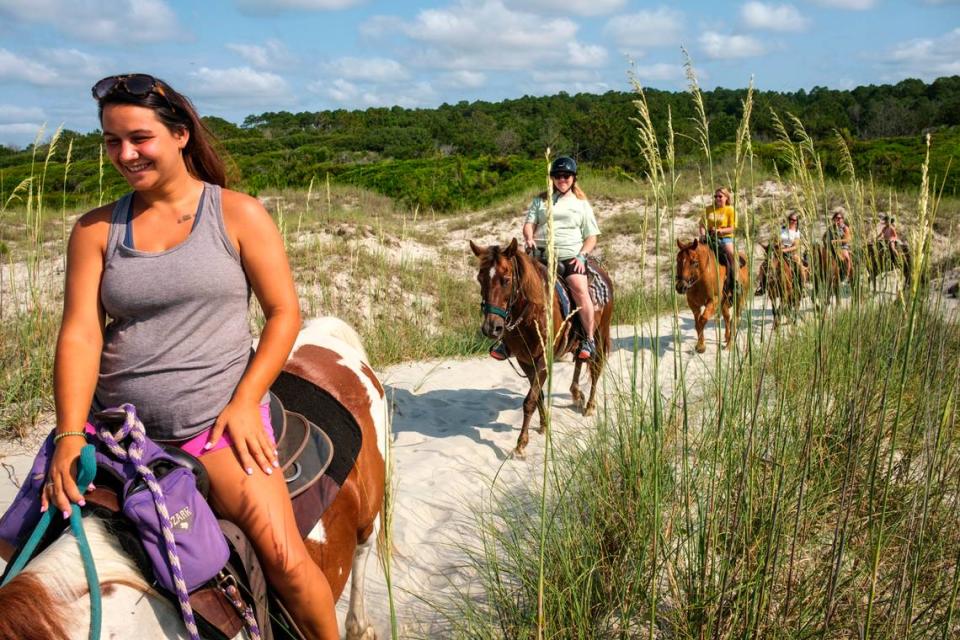From Foxes to Octopuses, strange animal sightings along the Myrtle Beach coastline
While shark sightings and pods of dolphins frolicking in the surf are not unusual, some Grand Strand tourists have encountered creatures they never expected to find along the Myrtle Beach shoreline. A visit to the Carolina coast can be a wild adventure.
Alligators in the surf in Myrtle Beach
While still considered unusual, almost every spring and summer along the Myrtle Beach coast, the Department of Natural Resources responds to calls about these toothy reptiles surfing our waves and walking the beaches.
While alligators prefer fresh water, they can tolerate salt water and likely come from nearby retention ponds.
Did you see the gator body surfing in Myrtle Beach?
Unfortunately, adult alligators can not be safely relocated according to Morgan Hart, the alligator project leader for the South Carolina Department of Natural Resources, because he says they have a strong “homing instinct” and a tendency to return. He recently told The Sun News, “What we do allow is for the relocation of smaller alligators, juvenile alligators, because they haven’t established a home territory yet, or alligators that are traveling from one place to another and end up somewhere they shouldn’t be, they can be relocated to the closest body of water.”
Harbor Seals make winter appearance on the Grand Strand
In December 2018, a harbor seal made multiple appearances along the Myrtle Beach shoreline delighting Christmas vacationers.
The seal, which appeared to have a shark bite injury on one flipper seemed to be recovering and it’s injury was not severe according to Rob Young, a marine biologist at Coastal Carolina University.
‘I thought it was a dog’: 11-year-old has surprise encounter with seal in Myrtle Beach
Harbor seals normally stick to cooler Northeastern waters, but occasionally venture further South in the winters and can appear off the Carolina’s coastlines according to the National Oceanic and Atmospheric Administration’s website.
Sea Stars ‘Starfish’ invasions like finding a pot of gold
While not uncommon it is still a fascinating site to see thousands of golden sea stars washing in on the waves and filling tidal pools along Myrtle Beach’s coastline.
Children often rush to gather the wriggling stars and get them back into the ocean.
In a 2020 Sun News report Ann Malys Wilson, interpretative ranger at Myrtle Beach State Park, encouraged people to put the live fish back into the water, but to be careful that the 5 armed creatures are fragile. She also said people should refrain from taking the live fish home.
Steer clear of the snakes on the beach
It’s rare to see snakes along Grand Strand beaches, especially those of the venomous variety, but they can get washed from their natural habitats onto our beaches after heavy rains.
In July, 2022 a Facebook video by Michelle Robert of a Timber Rattlesnake at Myrtle Beach State park horrified viewers and was widely shared by visitors and media.
ABC15 News reported that Russell Cavender, who runs a nuisance animal removal company, explained that the Timber Rattler aka the Canebrake Rattlesnake is one of the most venomous in the United States as it can deliver both neurotoxin venom and a hemotoxin venom, and should be avoided. Cavander is reported to have relocated the viper to a nearby swamp.
Octopuses are ‘once in a lifetime’ find on Carolina coast
While walking Cherry Grove Point in North Myrtle Beach this winter, Heather Leon spotted a bright red Common Octopus in the shallows and shared a video and her story with The Sun News.
According to Juliana Harding, a professor of marine science at Coastal Carolina University, Octopuses are bottom-dwellers, eating mostly crabs and bivalves like clams and oysters, so they don’t typically spend much time swimming along the beach but that as it was an unusually warm winter day the octopus had likely moved into the shallows to sun itself.
The South Carolina Department of Natural Resources has more information about the mollusks here.
Beachgoers walk the strand for foxes at dusk and dawn

Residents and visitors who know when and where to look, frequently spot foxes trotting between the dunes and hunting along the beaches.
The foxes are typically seen in early morning and late evening near wooded areas.
Jay Butfiloski, Furbearer project supervisor with the South Carolina Department of Natural Resources, told The Sun News that seeing foxes on the beach is normal, but it does not happen all the time because human activity sends them into hiding.
“Foxes are more visible in the daytime this time of year [early summer] because they are feeding their young. In a couple of weeks, the fox will be less visible during the day as it returns to a nocturnal schedule.” he said.
Equine friends may cause a double take
Horses may be the last thing that vacationers expect to see along our shores, but Horry County does, in fact allow horseback riding in select unincorporated areas from Nov. 1 through Feb. 28 in designated “equestrian zones”. Horry law describes these areas as the “central portion of the beach and is south of Myrtle Beach and north of Surfside Beach.”
Similar laws apply to Georgetown County beaches to the south.
At Waties Island, on the North end of the strand, the stables of Inlet Point Plantation provide visitors opportunity to ride on the beach. These riders and their steeds can be seen most mornings across the Cherry Grove Point in North Myrtle Beach.

The American Heart Association Beach Ride will host its 41st Annual AHA Beach Ride November 2-6 this year, where hundreds of horseback riders staying at Lakewood Camping resort get the rare opportunity to ride twenty miles of beachfront through downtown.

